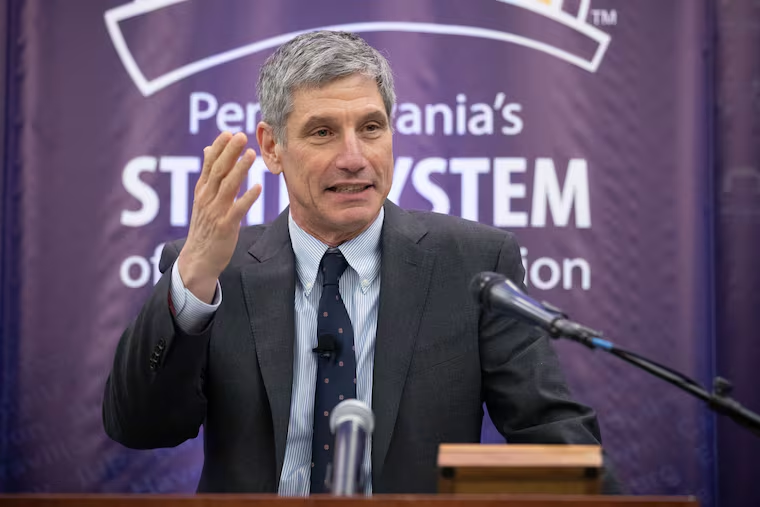Attention Pa. state students: Your tuition costs will remain the same for another year
Students will pay annual tuition of $7,716, the same as they paid since 2018-19.

Since 2018-19, most undergraduates at Pennsylvania’s state universities have paid the same annual tuition.
And next year will be no different.
For the fifth consecutive time, the board of governors for the Pennsylvania State System of Higher Education approved a tuition freeze for in-state students, who make up nearly 90% of enrollment, keeping their annual tab at $7,716.
Tuition also is frozen for most out-of-state undergraduates. The freeze applies to all 10 universities in the state system: Cheyney, West Chester, Shippensburg, East Stroudsburg, Kutztown, Millersville, Indiana, Slippery Rock, Commonwealth, and PennWest. It was recommended by Chancellor Daniel Greenstein, who noted he has not once recommended an increase since becoming chancellor of the 84,566-student system in 2018.
“We need to protect our students and the affordability of their education,” Greenstein told the board.
The annual cost for attending the system’s universities, including room and board, exceeds $22,000.
“It’s still not affordable,” Greenstein said in an interview earlier this week. “Everyone’s concerned that we are beginning to price out low- and middle-income students who we need to help most. That’s our job, figuring out how to remain accessible to them.”
» READ MORE: Temple raises tuition more than 4% for Pennsylvania and out-of-state residents
About a third of the system’s students are the first in their families to go to college, while about a third receive federal Pell grants because of financial need.
How is higher ed faring in Harrisburg?
The board made its unanimous decision Thursday despite a budget impasse in Harrisburg that has left the state without a final budget until lawmakers return to the Capitol in the fall. The House and Senate, however, both approved a 6% or $33.1 million basic funding increase for PASSHE, which would raise its appropriation to $585.6 million. That follows a sizable increase from the prior year. In the last two fiscal years, the state will have increased PASSHE’s funding by $108 million, or nearly 23%, if the spending plan passes.
The state also plans to provide $65 million to alleviate universities’ debt load, on top of another $175 million that was provided over the prior two years, according to the system.
» READ MORE: The chancellor of Pa.’s state universities makes a case for more funding
That’s in stark contrast to funding for the four state-related universities, Temple, Penn State, Lincoln, and the University of Pittsburgh, which has been held flat for several years. And this year, the legislature has not yet approved funding for those schools, with Republican lawmakers pushing for more transparency from the schools, which currently are not fully subject to Pennsylvania’s Right to Know law. Lawmakers also have called for the universities to freeze tuition.
The state-related universities may have to wait until the fall to know how much money they will be receiving from the state. The Senate isn’t scheduled to return to session until Sept. 18, and the House scheduled its next session for Sept. 26.
Greenstein, who has formed a partnership with the legislature across the aisle, said he appreciates the support from both lawmakers and Gov. Josh Shapiro.
“I’m grateful and the system is grateful that the General Assembly takes seriously the obligation toward its public system,” he said.
The state system had asked for a 3.8% increase in basic funding and another $112 million, most of it for direct financial aid to students enrolled in careers with employee shortages. The $112 million is not in the plan approved by both chambers.
Board chair Cynthia Shapira noted that the tuition freeze will put further strain on the system’s universities.
“But we think it’s worth it quite honestly, so we’re going to do it again,” she said.
Even though the system can’t get its funding until the budget is finalized, Greenstein said he’s not worried. The system also gets tuition revenue and has $675 million in reserves it could borrow from until the funding is released, he said.
Greenstein also said enrollment numbers for the 2023-24 school year appear promising after several years of decline.The system has lost nearly 30% of its students since 2010 when enrollment approached 120,000. Last year, enrollment fell more than 4%, but the number of freshmen rose for the first time since 2009, which the system cited as a bright spot. The system is expected to remain either flat or show a small uptick this year, he said.
Is PASSHE’s tuition freeze an outlier?
The PASSHE schools may be among few universities in the region to freeze tuition this year. Temple last week approved more than a 4% tuition increase for both in-state and out-of-state students, with in-state students, who make up the majority of Temple’s enrollment, paying a base tuition of $17,979 for 2023-24 and out-of-state students paying $32,376.
Also last week, Rutgers hiked its price tag by 6%, while the University of Pennsylvania announced in March that it was increasing tuition and other costs by 4%.
Pennsylvania State University’s board of trustees plan to vote on tuition increases at a meeting Friday. A committee of trustees on Thursday recommended that in-state students at University Park see a 2% increase in tuition, while out-of-state students get a 4% increase. In-state students at the Commonwealth campuses would not see tuition rise at all, while out-of-state students would get a 1% increase.